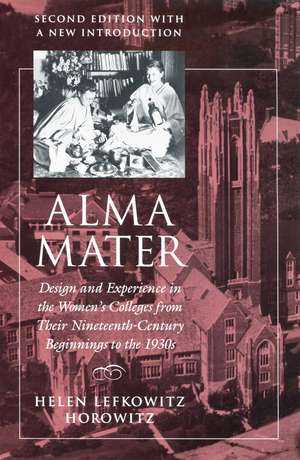Alma Mater: Design and Experience in the Women's Colleges from Their Nineteenth-Century Beginnings to the 1930s
Autor Helen Lefkowitz Horowitzen Limba Engleză Paperback – 27 oct 1993
An examination of the founding and development of the Seven Sisters colleges--Mount Holyoke, Vassar, Wellesley, Smith, Radcliffe, Bryn Mawr, and Barnard--Alma Mater focuses on the ideas behind their establishment and the colleges' architectural, academic, and social histories, as well as those of their twentieth-century successors--Sarah Lawrence, Bennington, and Scripps.
Preț: 228.07 lei
Preț vechi: 252.05 lei
-10% Nou
Puncte Express: 342
Preț estimativ în valută:
43.66€ • 45.00$ • 36.81£
43.66€ • 45.00$ • 36.81£
Carte indisponibilă temporar
Doresc să fiu notificat când acest titlu va fi disponibil:
Se trimite...
Preluare comenzi: 021 569.72.76
Specificații
ISBN-13: 9780870238697
ISBN-10: 0870238698
Pagini: 448
Dimensiuni: 156 x 235 x 33 mm
Greutate: 0.63 kg
Ediția:Second Edition, Second Edition
Editura: University of Massachusetts Press
Colecția University of Massachusetts Press
ISBN-10: 0870238698
Pagini: 448
Dimensiuni: 156 x 235 x 33 mm
Greutate: 0.63 kg
Ediția:Second Edition, Second Edition
Editura: University of Massachusetts Press
Colecția University of Massachusetts Press
Notă biografică
Helen Lefkowitz Horowitz is professor of history and American studies at Smith College. Her books include Campus Life: Undergraduate Cultures from the End of the Eighteenth Century to the Present; Culture and the City: Cultural Philanthropy in Chicago from the 1880's to 1917; and The Power and Passion of M. Carey Thomas.
Recenzii
"A fascinating history of the Seven Sisters colleges--Mount Holyoke, Vassar, Wellesley, Smith, Radcliffe, Bryn Mawr, and Barnard--together with three notable 20th-century spinoffs from the same group--Sarah Lawrence, Bennington, and Scripps."—Boston Globe
"Horowitz analyzes the architecture of each college as a way of understanding its social and cultural history. Blending the usual stuff of institutional history with a keen understanding of esthetics and design, Mrs. Horowitz shows how the physical plan of each college contained an implicit message about the way society perceived women, the limits placed on their aspirations, and the expectations about their relationship to one another. . . . She has done a splendid service in capturing the interrelationships among the nation's premier women's colleges in their formative years."—New York Times Book Review
"Meticulously documented and beautifully written, the book provides a brilliant analysis of the interaction among ideology, architecture, and social experience. The author underscores how much fears of unfettered womanhood entered into the plans of founders and leaders, but she also documents the determination of women students, faculty, and sometimes administrators to order their own experience."—American Studies
"An important contribution to social history and to the history of higher education in the United States."—American Historical Review
"Horowitz analyzes the architecture of each college as a way of understanding its social and cultural history. Blending the usual stuff of institutional history with a keen understanding of esthetics and design, Mrs. Horowitz shows how the physical plan of each college contained an implicit message about the way society perceived women, the limits placed on their aspirations, and the expectations about their relationship to one another. . . . She has done a splendid service in capturing the interrelationships among the nation's premier women's colleges in their formative years."—New York Times Book Review
"Meticulously documented and beautifully written, the book provides a brilliant analysis of the interaction among ideology, architecture, and social experience. The author underscores how much fears of unfettered womanhood entered into the plans of founders and leaders, but she also documents the determination of women students, faculty, and sometimes administrators to order their own experience."—American Studies
"An important contribution to social history and to the history of higher education in the United States."—American Historical Review
